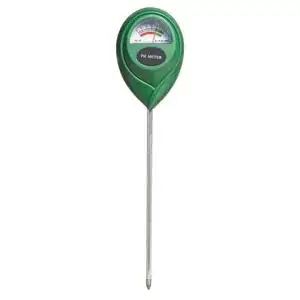Sounds as if you want to check the current ph of the soil itself, before amendment with your ashes. Either way, a ph test probe is probably easiest, but I've found it's important to take more than one sample for testing. Any areas which may have had something dropped on them, or added to them, (bird poo, old potting compost, an area with a bit of peat or manure in the soil already) will possibly give a different ph reading than an area even just 2 inches to the left or right, so I generally took several samples from different areas to get an idea.
I should add that the one I used (Rapitest ph meter) was supplied with several boilable test tubes to which soil samples were added for testing.
